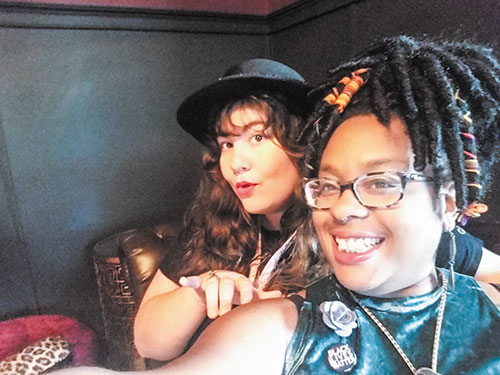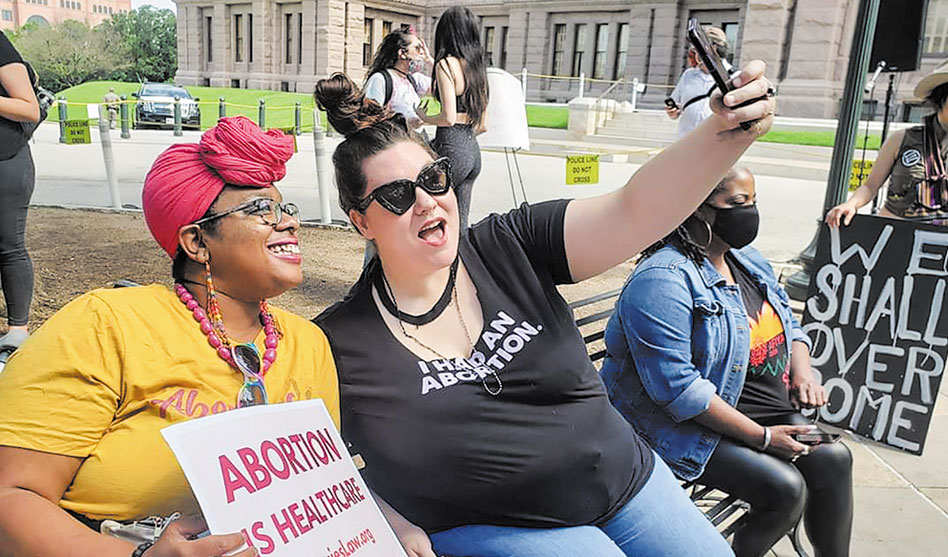Above, Kamyon Conner, left, and Rachel Hudson demonstrating in front of the Texas legislature and, right, mugging for the camera. (Photos courtesy Kamyon Conner)
One lesbian couple tells their story to show that abortion is an LGBTQ issue
DAVID TAFFET | Senior Staff Writer
taffet@dallasvoice.com
Rachel Hudson and Kamyon Conner first met at a Feminist Majority Leadership Alliance meeting at University of North Texas. “Then we kept bumping into each other,” Conner said, like the time they did The Vagina Monologues together.
Conner was out, but Hudson, who is bi, was not out to her family.
They had one night together where they kissed. But when summer came, Hudson moved back home from Denton to Mansfield. So they kept in touch by phone, and Conner visited Hudson at home.
But Hudson was also seeing a guy. And she got pregnant. She knew she was pregnant the next morning, Hudson said, explaining that body just felt different.
“I wasn’t surprised she got pregnant,” Conner said. “She was having too much fun that summer.”
But before Hudson was able to confirm her pregnancy, she said, she was done with her boyfriend. She was working three jobs to pay for school and biking to work, so she knew that she was not in a position to have a baby. But when she contacted the father to let him know about the pregnancy and ask for help with the abortion, he told her she should “just reach out to your lesbian friends.”
 That’s when she contacted Conner. And Conner drove down from Denton, picked up Hudson and took her to Planned Parenthood in Fort Worth.
That’s when she contacted Conner. And Conner drove down from Denton, picked up Hudson and took her to Planned Parenthood in Fort Worth.
“I waited for her in the waiting room all day,” Conner said.
Hudson described the day: Intake took awhile. Then the procedure and a D-and-C, followed by very attentive aftercare. When Hudson was released, Conner took her to the store to pick up supplies she’d need.
That day, Conner said, was the turning point in their relationship. “She was so vulnerable,” Conner said. “And I felt honored she let me be that support person.”
The two became much closer and continued to engage in activism together, especially in the area of reproductive justice. They attended protests together in Dallas, Austin and Washington, D.C.
Conner said the new abortion law passed by the Texas Legislature this session and signed into law by Gov. Greg Abbot in June would have prevented Hudson from getting her abortion. That law prevents abortions after six weeks of pregnancy, and Hudson was closer to nine weeks. Many women don’t even know they’re pregnant until at least two months, Conner noted.
A life together
Between the time Conner and Hudson met in 2008 and when they began living together in 2017, Conner said she went through an abusive relationship. But after beginning her relationship with Hudson, she said, “I wrote a list of what I wanted in life [and realized] ‘Oh, my God. I could have it with this woman.’”
The couple were married last December in the Chickasaw National Recreation Area in Sulphur, Okla. They described it as “a small COVID wedding” limited to 20 people — including the couple, officiant, family and a few friends — and held outdoors. The pastoral setting was by a beautiful waterfall.
Conner and Hudson said they have a message for the LGBTQ community: Queer people have abortions. The rate of teen pregnancy is high among queer teens. The reasons are varied: Some are trying to prove they’re not lesbian; others are looking for affection, wherever it comes from, after being rejected by their families. And others who have been thrown out of their homes sell themselves to earn some money to live.
On top of everything else, Texas law prevents sex education that includes any information relevant to LGBTQ teens, so many teens simply tune out sex ed classes. Birth control information, when offered, is often ignored.
Whatever the reasons, Conner, said, the state’s new abortion law will particularly hurt young queer people.
In addition, the law allows anyone to sue someone who is involved in the abortion. “I could have been sued,” Conner said, for simply driving Hudson to Planned Parenthood. She said the law is designed to stigmatize and shame people who are accessing their right to have an abortion.
Years after having had the abortion, Hudson said she would make the same decision again, and Conner supports her in that.
Conner said in Texas, not only can abortions not be funded by Medicaid, but private insurance is not allowed to include abortion as a benefit. That inspired her to first volunteer with the Texas Equal Access Fund, a non-profit organization that helps women pay for an abortion. Today she serves as the organization’s executive director.
Hudson works as a case manager for children with intellectual disabilities.
Although they bonded over an abortion, they’ve built a great life together while both helping others in their careers.












